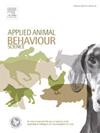The maintenance conditions of the zebrafish (Danio rerio) breeding stock affect the survival and behavior of their offspring
IF 2
2区 农林科学
Q1 AGRICULTURE, DAIRY & ANIMAL SCIENCE
引用次数: 0
Abstract
The environment in which we live influences our biological traits throughout our ontogeny, being markedly significant during the beginning of our lives. Some characteristics inherited (genetically and/or epigenetically) from parents can also influence individual development, known as transgenerational effects. In this study, we aimed to evaluate the transgenerational effects in the offspring of parental fish prior exposed to different environments in terms of quality (from poor quality to good quality one). We evaluated the consequences of different parental environmental quality on survival and behavior of their offspring. The zebrafish (Danio rerio) was used as our experimental model. To do that, zebrafish breeders were kept in different environments (stressful (poor quality), standard (neutral) or enriched (high quality)) for 15 days before reproduction. After this maintenance period, the breeders reproduced, and their offspring were evaluated for survival and exploratory behavior. Our results show that breeders kept under low welfare conditions (stressful environment) produced offspring with higher mortality rates compared to the other environmental conditions. Also, the survived offspring of parents that were in low welfare conditions exhibited increased anxiety as detected in behavioral tests. Thus, we conclude that the maintenance environment of breeders significantly affects the development of traits of their offspring, emphasizing the importance of breeders’ welfare for both fish farming and scientific research laboratories.
斑马鱼(Danio rerio)种畜的维持条件影响其后代的生存和行为
我们生活的环境在整个个体发育过程中影响着我们的生物特征,在我们生命的开始阶段尤为显著。从父母遗传(遗传和/或表观遗传)的一些特征也会影响个体发展,称为跨代效应。在本研究中,我们旨在评估亲本鱼在不同质量环境(从差质量到好质量)下的后代的跨代效应。我们评估了不同的亲代环境质量对其后代的生存和行为的影响。以斑马鱼(Danio rerio)为实验模型。为此,在繁殖前将斑马鱼饲养在不同的环境中(压力大(质量差),标准(中性)或丰富(高质量))15天。在这个维持期之后,繁殖者繁殖,并评估其后代的生存和探索行为。结果表明,低福利条件下(应激环境)繁殖的后代死亡率高于其他环境。此外,在行为测试中发现,低福利条件下父母的幸存后代表现出更多的焦虑。因此,我们得出结论,育种者的维持环境显著影响其后代性状的发育,强调了育种者福利对养鱼和科研实验室的重要性。
本文章由计算机程序翻译,如有差异,请以英文原文为准。
求助全文
约1分钟内获得全文
求助全文
来源期刊

Applied Animal Behaviour Science
农林科学-行为科学
CiteScore
4.40
自引率
21.70%
发文量
191
审稿时长
18.1 weeks
期刊介绍:
This journal publishes relevant information on the behaviour of domesticated and utilized animals.
Topics covered include:
-Behaviour of farm, zoo and laboratory animals in relation to animal management and welfare
-Behaviour of companion animals in relation to behavioural problems, for example, in relation to the training of dogs for different purposes, in relation to behavioural problems
-Studies of the behaviour of wild animals when these studies are relevant from an applied perspective, for example in relation to wildlife management, pest management or nature conservation
-Methodological studies within relevant fields
The principal subjects are farm, companion and laboratory animals, including, of course, poultry. The journal also deals with the following animal subjects:
-Those involved in any farming system, e.g. deer, rabbits and fur-bearing animals
-Those in ANY form of confinement, e.g. zoos, safari parks and other forms of display
-Feral animals, and any animal species which impinge on farming operations, e.g. as causes of loss or damage
-Species used for hunting, recreation etc. may also be considered as acceptable subjects in some instances
-Laboratory animals, if the material relates to their behavioural requirements
 求助内容:
求助内容: 应助结果提醒方式:
应助结果提醒方式:


